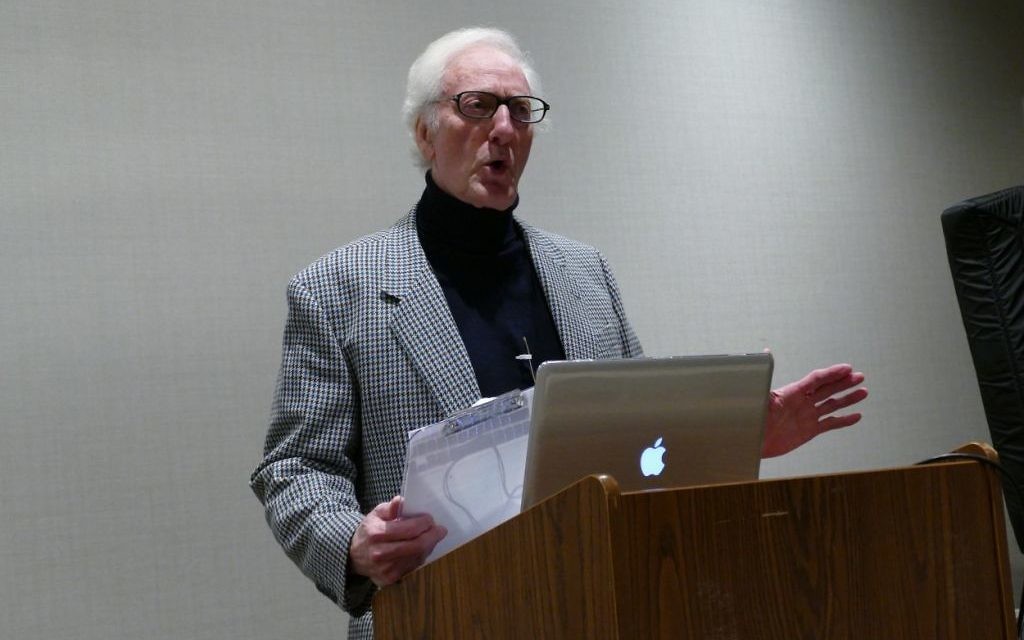7 Documentary Picks Reveal Form’s Evolution
“Documentary films have changed and are much more important in the world today,” Bob Bahr said at the second of the two Atlanta Jewish Film Festival Best Bets events Sunday, Jan. 3, at Temple Sinai.
His co-host, Emory film professor Matthew Bernstein, said: “Documentaries have become a different type of business since Michael Moore showed you could make over $200 million from a documentary. He changed the perception of documentaries in America.”

Bahr spoke of the importance of documentaries because we can be exposed to Jewish issues and history in ways that we couldn’t explore in the past.
Get The AJT Newsletter by email and never miss our top stories Free Sign Up
Bernstein and Bahr detailed different documentary styles, such as classic, which relies on simple production and a smart interviewer, as in the case of the first of their must-see documentary picks, “What Our Fathers Did: A Nazi Legacy.”
Narrator Phillipe Sands, a human rights lawyer, interrogates the sons of two high-ranking Nazi officials, allowing them to reveal themselves and their vastly different attitudes about their lineage through their answers, facial expressions and reactions to his questions. Bernstein said it is “a film that is very much about dealing with history, inherited history, and in these two different men, the process of acceptance of a past that is very uncomfortable. And the persistence of denial.”
Bahr contrasted the classic style with the use of re-enactment in “The Three Hikers,” which re-creates events related to the 2009 capture and ensuing 26-month imprisonment of three social advocacy workers by Iranian authorities along a blurry Kurdistan border, then lets the detainees retell events and interviews their families and human rights authorities.
Two best bets are about Yitzhak Rabin. Through a painstaking assemblage of recordings, tapes, home movies, letters and interviews, the assassinated prime minister tells his own life story in “Rabin in His Own Words.” It brings us through the events leading up to the 1993 Oslo Accords. That agreement included the highly contentious withdrawal of Israeli troops from parts of the West Bank and Gaza Strip. Amid chants from crowds that “Rabin is a traitor,” Rabin speaks of the need to realize that “peace is made with enemies … sometimes very cruel enemies.”
To complete the Rabin picture, Bahr and Bernstein recommend also seeing “Rabin, the Last Day.” This lengthy yet worthwhile film represents an evolution in documentaries as well, as it paints an unsavory picture of characters and events just before the assassination in November 1995. This work falls into the more heavy-handed documentary category, in which director Amos Gitai takes and maintains a strong stance.

What is purportedly a campaign rally for Benjamin Netanyahu is instead shown as a violent protest, with Netanyahu preaching Zionism and speaking against a government that is leading the people astray. Some in the crowd call for “death to Rabin” while others set fire to his image. Regarding the portrayal of Netanyahu, Bahr said the film is “not so much a documentary as it is an indictment” for incitement to violence and complicity.
“Sabena Hijacking: My Version” re-enacts the terrifying and exhilarating events of the 1972 hijacking of Sabena Flight 971 en route from Vienna to Tel Aviv and the subsequent rescue. The story is enhanced through passenger testimonies and newfound recordings of the plane’s pilot, in addition to an interview with the sole surviving female hijacker from the Palestinian group Black September. According to Bernstein, “Sabena” is a crowd-pleasing, feel-good story,
“Censored Voices,” winner of the Israeli Academy Award for best documentary, is a look back at Israeli soldiers who fought in the Six-Day War. Men who were interviewed within three weeks of Israel’s crushing victory over Arab forces listen and react to the recordings nearly half a century later, revealing startling and sobering insights into the price of war and raising the question of whether there ever is a decisive victor.
“By Sidney Lumet,” recapping the 50-year career of the filmmaker, who died in 2011, is the final documentary best bet. Film clips and interviews with Lumet are used to illustrate how he exposed his audience to the humanity of even the most distasteful of his characters in iconic films including “Serpico,” “Dog Day Afternoon” and “Network.”





comments